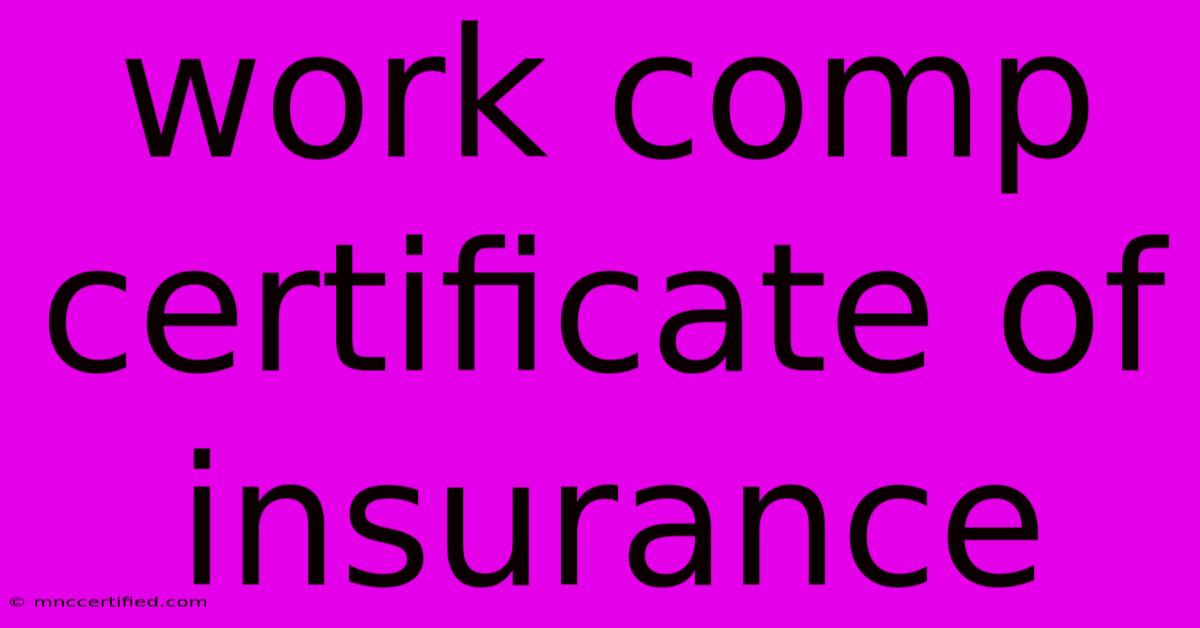Work Comp Certificate Of Insurance

Table of Contents
Understanding Your Work Comp Certificate of Insurance (COI)
A Certificate of Insurance (COI) for Workers' Compensation is a crucial document proving your business carries the legally required workers' compensation insurance. This isn't just a formality; it's a vital piece of paperwork that protects both your employees and your business. Understanding its importance and contents is essential for every business owner. This guide will walk you through everything you need to know about your work comp COI.
What is a Workers' Compensation Certificate of Insurance?
A Work Comp Certificate of Insurance, or COI, is a formal document issued by your insurance company. It verifies that you have an active workers' compensation insurance policy in place. This document acts as proof of insurance and is often requested by clients, contractors, and even some landlords. It essentially confirms you're meeting your legal obligations to protect your employees in case of workplace injuries or illnesses. Think of it as your official proof of coverage.
Why is a Work Comp COI Important?
The importance of a Work Comp COI cannot be overstated. Here are several key reasons why:
-
Legal Compliance: Most states mandate workers' compensation insurance for businesses with employees. A COI demonstrates your compliance with these laws. Failure to comply can lead to significant fines and legal repercussions.
-
Client Requirements: Many businesses require their contractors and subcontractors to provide a COI as a condition of doing business. This protects them from potential liability if a worker is injured on their site.
-
Risk Mitigation: A COI shows potential clients and partners that you take workplace safety seriously, minimizing their risk of financial liability.
-
Protection for Employees: Most importantly, a valid COI ensures that your employees are protected in the event of a workplace injury or illness. This coverage often includes medical expenses, lost wages, and rehabilitation costs.
Key Information Found on a Work Comp COI
A typical Work Comp COI will include the following essential information:
-
Policyholder Name and Address: This clearly identifies the business insured.
-
Insurance Company Name and Address: This shows who issued the policy.
-
Policy Number: This unique number identifies the specific policy.
-
Effective Dates: This shows the start and end dates of the coverage.
-
Type of Insurance: Specifically states "Workers' Compensation Insurance."
-
Coverage Limits: This indicates the maximum amount the insurance company will pay for covered claims.
-
Additional Insured (if applicable): This section might list other entities covered under the policy.
-
Agent or Broker Information: Contact details for your insurance agent.
What to Do if You Need a Work Comp COI
If you need a COI, contact your workers' compensation insurance provider. They will typically provide this document either digitally or by mail. Ensure the COI is current and accurately reflects your current policy details. Request a new COI whenever your policy is renewed or updated.
Common Mistakes to Avoid
- Using an outdated COI: Always ensure the COI reflects your current coverage. An expired COI is useless.
- Not understanding your policy: Before relying on your COI, make sure you fully understand your workers' compensation coverage.
- Failing to provide a COI when requested: Neglecting to provide a COI when requested can damage your business relationships and lead to missed opportunities.
By understanding the importance and contents of a Work Comp Certificate of Insurance, you're taking a vital step in protecting your business, your employees, and your future. Ensure you always have a valid and up-to-date COI on hand.

Thank you for visiting our website wich cover about Work Comp Certificate Of Insurance. We hope the information provided has been useful to you. Feel free to contact us if you have any questions or need further assistance. See you next time and dont miss to bookmark.
Featured Posts
-
John Lewis Christmas Ad 2024 Product List
Nov 15, 2024
-
Messi Vs Paraguay Record And Impact
Nov 15, 2024
-
Marc Anthony Repair Bond Rescuplex
Nov 15, 2024
-
Tate Mc Raes New Album So Close To What 2025
Nov 15, 2024
-
Rfk Jr Named Health Department Head
Nov 15, 2024